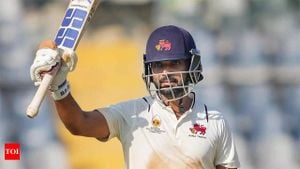The impeachment trial of South Korean President Yoon Suk-yeol has entered controversial waters as allegations of illegal surveillance and suppression of media have emerged during recent hearings. Witness testimony from former Minister of the Interior and Safety, Lee Sang-min, has been at the forefront of these allegations as he categorically denied any orders issued by the President to curtail utilities to media outlets during a state of emergency.
On February 11, the Constitutional Court of South Korea convened for its seventh impeachment hearing, where Lee was called to testify. The crux of the allegations lies within supposed instructions from President Yoon related to cutting off water and electricity supply to specific media organizations on December 3, during heightened tensions and civil unrest. Lee redressed these accusations head-on, stating, "At no point was there ever any instruction received to cut off utilities from the President or the Minister of Defense," highlighting the discrepancies within the charges.
Evidence presented by the prosecution reportedly contained documents indicating Yoon had directed Lee to carry out utility cuts to outlets like The Hankyoreh, MBC, and JTBC, branding these media as targets during the emergency. Lee’s steadfast denial of such instructions has cast doubts on the credibility of the prosecution’s case. "The idea of cutting utilities being under the jurisdiction of the fire department seems unreasonable," he added, undermining claims of operational authority over such decisions.
Adding complexity to the matter, during the proceedings, Lee acknowledged having "briefly seen some papers on the President's desk mentioning something about utilities, but I did not act on them.” This statement was pivotal, indicating he had no knowledge of any nefarious intentions associated with the brief view of the notes at hand but rather maintained focus on public safety during the state of emergency.
Lee emphasized his commitment to the safety of citizens during the crisis, explaining he did not wait for specific instructions from the President, stating, "If any instruction had come from the President, I would have communicated it without delay to the fire chief during such urgent circumstances." Lee’s actions demonstrated his prioritization of public safety above political machinations.
The ramifications of these proceedings stretch beyond Lee’s testimony, reflecting on South Korea’s socio-political atmosphere. Investigators and jurists grapple with the fine line of governance during emergencies and its impact on press freedoms and civil liberties. The origin of these allegations presents serious concerns about the methods employed by the administration to manage public dissent and media independence.
With continuing discussions around governance models, such occurrences raise alarm bells about the state’s accountability to its citizens and the policies enacted during precarious times. The South Korean public remains vigilant, with media outlets examining closely how political maneuvers affect their operations and freedom.
Lee’s testimony casts significant shadows over the prosecution's claims, leaving many to ponder the legitimacy of the President’s actions during this grave state of emergency. Will the courts’ upcoming decisions ripple through South Korea’s political fabric or reinforce existing structures? The proceedings continue to evolve, and those involved are bracing for the outcomes, each deeply woven with national consequence.



